"What did I tell you, no one remembers Blacula except us and Quentin Tarantino." |
Sean Spencer – Psych, season 6, episode 3: This Episode Sucks |
I have little doubt that the whole concept of what became known as Blaxploitation cinema must seem a little daffy to those younger film fans still working their way back to the glory days of the 70s. As that portmanteau moniker suggests, these were exploitation films targeted primarily at a black audience. An urban black American audience if you want to be precise. The films featured primarily black actors and were often directed by black filmmakers, who brought a fresh cultural angle to a range of genre tales that made sometimes old stories feel like something new. Which in a way, they were.
It all really kicked off in 1971 with the cult success of Melvin Van Peebles' indie favourite Sweet Sweetback's Baadasssss Song and the Hollywood financed Shaft, which was directed by former photographer Gordon Parks. Even if you've never got around to seeing Shaft, I'm guessing you've probably heard of it and can even hum Isaac Hayes' super-cool theme song. Shaft found popularity far beyond its target audience and did big enough business to be credited by some as the film that saved MGM from bankruptcy. Who's the cat who shows those fat white studio bosses how it should be done? Shaft! And as every schoolboy knows, if a film makes big money then others will soon come along and try to emulate its success. It thus seemed inevitable that sooner or later a Blaxploitation horror film would join the string of crime-themed movies that followed in Shaft's wake. In retrospect at least, it seems equally unsurprising that the first of these would be produced by exploitation kings American International.
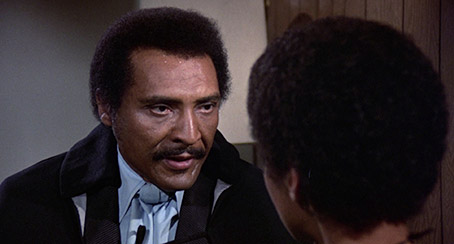
Blacula is a title that that you only have to say out loud to prompt a disbelieving chortle from pretty much anyone who has never heard of the film. While I understand the thinking behind it, it always struck me as just a little bit racist. He's like Dracula, right? But he's black. So let's call him 'Blacula'. Because he's not white like other vampires. He's black. Blacula. Geddit? As it turns out, this is very much part of the film's setup.
It all begins in 1780 in the castle of a bearded Count Dracula (Charles Macaulay – notice he's not referred to as 'Beardula'). He is playing host to an African ruler named Prince Mamuwalde (William Marshall) and his attractive wife Luva, who are seeking the Count's assistance in fighting the slave trade. It turns out that Drac has no intention of lending his name to this particular cause and even throws a couple of racial insults in for good measure. In the fracas that follows, the Count bites Mamuwalde and transforms him into a vampire, then imprisons him in a coffin so that he will be unable to satiate the gnawing thirst for human blood that will soon overwhelm him. Before doing so, he leans over him and gloats, "I curse you with my name. You shall be... Blacula!" This is clearly not intended as a badge of honour. Luva, meanwhile, is chained up in front of the coffin and left "until your black flesh rots from your bones." I genuinely never realised that as well as being the king of vampires, Dracula was also a racist prick.
Hop forward to 1972, and the coffin is part of an estate that has been purchased and shipped to Los Angeles by a pair of mincingly camp interior decorators named Bobby and Billy, who open the box and quickly become the revived and very thirsty Mamuwalde's first victims. These guys are symptomatic of the one real irritation that runs throughout the film, an attitude to homosexuals that's as prejudiced as anything that black characters have been subjected to in the cinema of years past. This reaches a kind of bigoted peak when Bobby's body disappears from the morgue and a detective asks his companion, "Who the hell would want a dead faggot?" Sheesh.
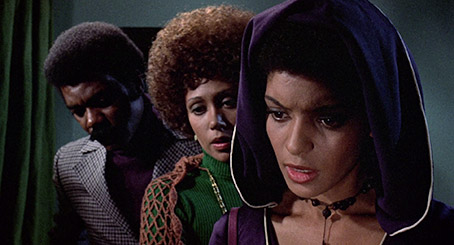
Spying on Bobby's funeral, Mamuwalde claps eyes on Tina Williams (Vonetta McGee). Believing she is the reincarnation of Luva (well she really looks like her), he pursues her with an enthusiasm that sends her scurrying. He later re-introduces himself in a non-threatening manner while Tina is hanging out with her sister Michelle (Denise Nicholas) and Michelle's boyfriend Gordon (Thalmus Rasulala). They're a nice enough pair, but unfortunately for Mamuwalde, Gordon is a pathologist with the unlikely sounding Scientific Investigation Division of the Los Angeles Police. He was at the funeral too, undoing the hard work that the mortician had put in to concealing those nasty bite marks on the unfortunate young man's neck. And Dr. Gordon isn't one of those people who mocks the idea that there might be a vampire loose in his city. He's also not completely sure about Mamuwalde, but after spending a little time in his oh-so charming company, Tina now thinks the man is just fine.
What follows is in some ways formula stuff. Mamuwalde continues to feed on the locals and seduce the woman who resembles his late wife, the Doc struggles to convince his cynical colleagues that vampires are the real deal, and it all builds to a stand-off between the vampire and vampire hunter. But in other ways the film really was treading new genre turf. Far from simply becoming victim of vampiric seduction, Tina actually falls for Mamuwalde and is not scared off when she learns the truth about him. And it's an easy pill to swallow, given that Mamuwalde, in spite of his callous disregard for those he feeds on, is as charming and sophisticated a vampire as you'll find in 70s horror cinema (kudos to actor William Marshall here, who has one of the best cultured basso voices this side of Christopher Lee). The vampire bite as an infectious disease metaphor is also given full reign, with just about everyone who gets bitten rising from the dead and going on to infect others. That said, the incubation period does seem to vary on a bite-by-bite basis, from a couple of minutes to several days, depending on the demands of the scare in question. But when the vampires bite here, they really chow down on their victims. For once, you really can believe that they are guzzling blood from the wounds they inflict.
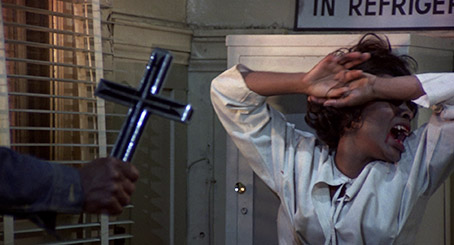
The film is very much a product of its day, but that's not such a bad thing. As Kim Newman suggests in his accompanying video essay, both Blacula and its sequel (I'm getting to that) have become interesting barometers of their time and place, and I'm not just talking about the fashions, the hip dialogue and the seriously groovy R&B score. There's a definite socio-political edge to some of the encounters and dialogue, and at a time when the police were making few friends in the black community and were still clubbing protestors, I'll bet good money that the black and even the white youth audience of the day were openly cheering at the sight of uniformed cops taking a beating from black vampires.
In spite of a title that tends to suggest otherwise, Blacula rises well above the opportunism that gave it birth. Its lead actor is effortlessly charismatic, the vampires themselves are a credible threat (despite the expected quota of "look at my fangs!" snarling), the story is smartly developed, and there are elements that genuinely advance the genre. It also has a seriously neat ending that I can't talk about in detail without earning my spoiler badge, plus one of the very best vampire attack scenes you'll find anywhere in horror cinema, a single-shot doozy in which a freshly resurrected female cabbie tears down a corridor towards the camera in slow motion and effectively sinks her teeth into the audience's neck.
It's perhaps almost inevitable that a film that did so well at the box office would give birth to a sequel, which arrived the following year in the shape of Scream Blacula Scream. It's a no-fuck-around title that can't help but prompt certain expectations, that it will be more sensational than its predecessor and perhaps even play it for camp laughs rather than scares. But that's not what you get. No sir. As far as I'm concerned, Scream Blacula Scream is that rarest of horror beasts, a sequel that's actually superior to the original.
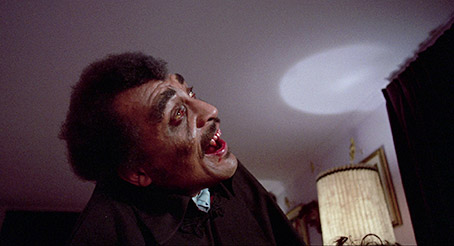
The problem I've got here is that I can't get into how this film begins without giving away what happens at the end of the last one. Well, sort of. I'm not going to reveal what was cool about that ending, just the bit you'd have to have never seen a vampire movie in your life not to have guessed. If by some chance that includes you (seriously, where have you been), then hop ahead to the next paragraph and you'll be reasonably safe. For the initiated, it goes like this. When Voodoo queen Mama Loa dies, her mantle is inherited by the gifted young Lisa Fortier (played by cult film favourite Pam Grier). This does not go down well with Mama Loa's self-centred dick of a son Willis (Richard Lawson), who struts around making a lot of noise before being requested to leave by a man big and tough enough to squash him into jam. Willis pays a visit to a former Voodoo shaman and buys a bag of bones from him that are supposed to have special powers. Want to guess whose bones? Willis subjects them to a convincing enough Voodoo ritual that resurrects Mamuwalde, who wastes no time in transforming his unfortunate saviour into a vampire. It's typical of Willis that while he rather enjoys the idea of being a creature of the night, he is outraged that he is no longer able to check out his good looks in a mirror.
Lisa, meanwhile, is at a gathering organised by her boyfriend Justin (Don Mitchell), an ex-cop with an interest in the occult and a collection of African antiquities, which he is displaying before handing it over to the local university museum. By chance (or not – who's to say?), Mamuwalde just happens to be passing and drops in to offer some expert advice on a necklace that used to belong to his late wife Luva, in the process charming his way into Lisa's good books. When Lisa's friend Gloria falls victim to a bite that drains her of her blood, Justin's still active former partner, Harley Dunlop (Michael Conrad, dry-running for his later role as Sgt. Phil Esterhaus in Hill Street Blues – let's be careful out there!), suspects that Lisa and her Voodoo may be the cause. But when two pimps who stupidly try and rob Mamuwalde are found in a similar condition a few blocks away, Justin starts to suspect that there might be another, more sinister explanation.
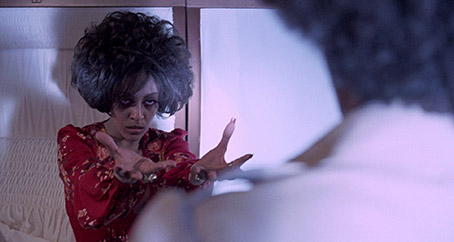
Plot-wise, Scream Blacula Scream (whose working title was apparently 'Blacula is Beautiful' – how cool would that have been?) is almost gossamer thin, to the point where what story there is could probably have been told in a third of the film's running time without breaking a sweat. But the change of director from William Crain to the somewhat whiter Bob Kelljan, who had already proved his genre worth as the director of the Count Yorga films, shifts the emphasis from plot and pace to the almost showpiece staging of individual scenes. Crucially, Kelljan lingers on sequences and favours atmosphere over incident, a bloody big gamble in a film whose title seems to promise even more action than its forebear. But it pays off. I can hardly believe I'm saying this about what was designed primarily to cash in on the success of its exploitation predecessor, but there are sequences in Scream Blacula Scream that are actually pretty scary. Music is put to more unsettling use this time around, and the scene where Gloria returns from the dead and tries to entice Lisa into getting close enough to bite her is up there with the tapping on the window sequence from Salem's Lot.
Vampirism and Voodoo may seem unlikely bedfellows (I know, they both begin with 'V'...), but they are neatly interwoven here and build to a climax in which your sympathies really are with Mamuwalde, until an untimely (and bloody unfair) disruption unleashes the monster within. This is carried through to an ending that manages to top that of its predecessor and blend these dual mythologies with an invention that frankly borders on genius.
If you're a vampire movie aficionado and haven't seen the Blacula films then you're in for a treat. They're worth your time for William Marshall's smooth and sophisticated neck-biter alone, but there's so much more to savour here. Like all good vampire movies, they move the genre forward, and there are a handful of scenes here that rank among the strongest and smartest you'll find in 70s vampire cinema. Capturing the essence of their time and place as well as any documentary record of the period, they helped to bring the genre into the modern age, and remain to this day two of the coolest vampire films of the period.
Both films have been restored, though by whom is not specified here (I've heard MGM mentioned elsewhere). Blacula in particular looks absolutely lovely – the odd dust spot remains, but you have to be looking out to see them, as for the most part the image is sparkling clean and betrays not a whisper of picture judder. The contrast range is most impressively pitched, boasting crisp black levels without sacrificing picture information, no mean feat in films that are set largely at night. Colours are rich when they need to be without feeling over-saturated, and skin tones are very well rendered throughout. Grain is more visible and the image just slightly less vibrant on Scream Blacula Scream, but in all other respects it's the equal of its predecessor. It's always thrilling to see low budget films looking as good as this – that's what you get when you shoot on 35mm and put the material in the hands of restorers who know their job.
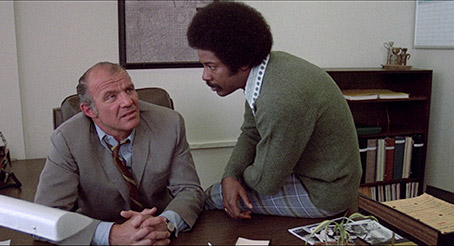
The Linear PCM mono 2.0 tracks on both films are free of damage and background hiss, but do betray the films' age and low budgets a little more readily than the image, having a sometimes narrow dynamic range and a notch less clarity than you'd expect from a studio film of the period. Music is decently reproduced, however, especially in the second film.
Kim Newman on Blacula (24:19)
In what is effectively a video essay, the venerable Mr. Newman does his best to gazump my review by covering much of the same ground I had outlined in my notes. It's still an enthralling piece that sets the scene of 70s Blaxploitation cinema and goes on to explore the merits of both films from a number of interesting angles. Mr. Newman's extensive knowledge of the genre enables him to pinpoint the influences on the films and their subsequent influence on later works, and without him I would never have known that Ketty Lester, who plays the street smart female cabbie Juanita Jones in the first film, was a singer whose hits included the mesmerising 'Love Letters', which was put to such memorable use by David Lynch in Blue Velvet.
Trailers
Included here are trailer for Blacula (1:52), where an echoing voice over reveals that our man is "Dracula's soul brother," and Scream Blacula Scream (1:58), which features "William Marshall, again, as the Lord of the Vampires, in a relentless search for Pam Grier." Come again?
Booklet
A handsomely designed booklet containing three essays by Blaxploitation expert Josiah Howard, one on each film and a brief third on 70s double-bills. There are reproductions of a number of posters and front-of-house stills, plus credits for both films, and I was unreasonably delighted to see the page numbers framed inside the silhouette of a bat.
Horror goes Blaxploitation and shows the big studio boys how it should be done in two of the most enjoyable and endearing vampire movies of the 1970s. Two fine genre features for the price of one, both handsomely restored and supported by a couple of very neat extra features. What's not to love? Enthusiastically recommended.
|